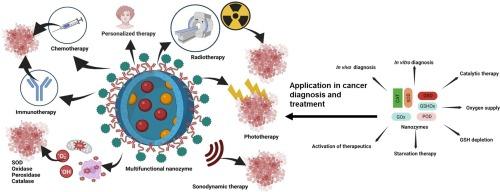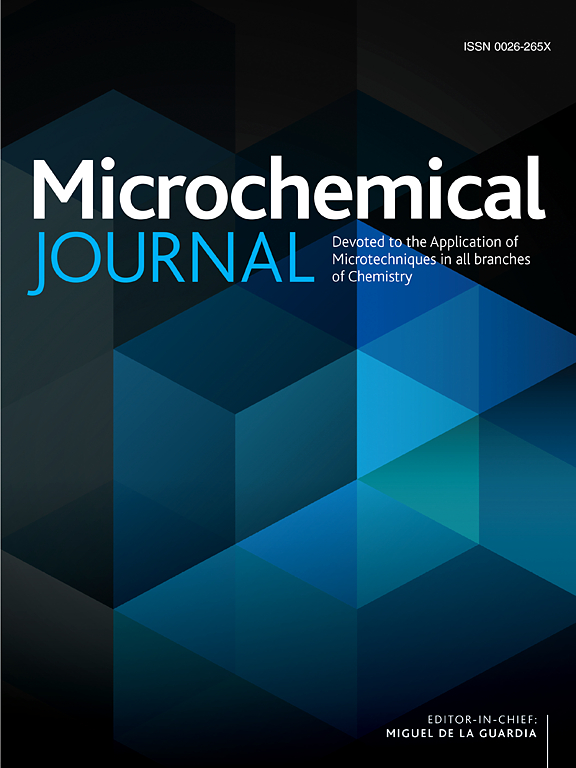纳米酶的前沿:加强癌症诊断和治疗策略
IF 4.9
2区 化学
Q1 CHEMISTRY, ANALYTICAL
引用次数: 0
摘要
纳米酶具有类似酶的特性,将纳米技术与生物学联系在一起,这令科学家们非常感兴趣。2007 年,随着仿酶磁性纳米粒子(NPs)的发现,纳米酶的研究呈现爆炸式增长。在过去十年中,纳米酶揭示了其催化秘密,并扩大了其应用范围。生物催化肿瘤治疗利用纳米酶作为微小的酶模拟物,治疗各种癌症。这种方法结合了纳米技术和酶驱动的生物催化。此外,新型纳米催化剂通常采用多价离子作为催化剂中心,据广泛报道,其催化性能优于酶。它们在生物体内也具有更好的稳定性、功能多样性和更低的生产成本。最近的一项研究表明,用于肿瘤生物催化治疗的纳米酶很有前景,因为恶性肿瘤会改变或改变多种酶。此外,目前该领域的研究更多地集中在铁基纳米结构上,因为铁基纳米结构制作简单、生物相容性好、具有良好的物理性质,能有效催化生物过程,并通过铁跃迁在很大程度上增加肿瘤缺氧和活性氧(ROS)介导的损伤。除上述特性外,纳米酶还能增加与某些分析物的显色或荧光化学氧化作用。这种颜色变化或荧光信号可以识别和量化目标生物标记物。本综述涵盖了用于医疗目的的纳米酶研究,包括其固有的酶特性、用于生物标记物检测的生物传感应用以及其他引人入胜的潜力。我们还讨论了可能影响其临床应用和未来进展的主要问题。本文章由计算机程序翻译,如有差异,请以英文原文为准。

Frontiers of nanozymes: Enhancing cancer diagnosis and therapeutic strategies
Scientists are intrigued by the enzyme-like characteristics of nanozymes, which connect nanotechnology and biology. In 2007, nanozyme research exploded with the discovery of enzyme-mimicking magnetic nanoparticles (NPs). Over the last decade, nanozymes have revealed their catalytic secrets and expanded their applications. Biocatalytic tumor treatment uses nanozymes as a tiny enzyme mimics, to treat various cancers. This method combines nanotechnology and enzyme-driven biocatalysis. In addition, novel nanocatalysts usually employ multivalent ions as catalyst centres and are widely reported to outperform enzymes in catalysis. They also have better stability in living organisms, functional versatility, and lower production costs. A recent study suggests that nanozymes for biocatalytic tumor treatment could be promising because malignant tumors can change or alter numerous enzymes. Furthermore, the current research in this domain focuses more on iron-based nanostructures because they are simple to make, biocompatible, have promising physical properties, and can catalyze biological processes efficiently; and largely increase tumor hypoxia and reactive oxygen species (ROS)-mediated damage via ferroptosis. Apart from the above-mentioned properties, nanozymes can increase chromogenic or fluorogenic chemical oxidation with certain analytes. This colour change or fluorescence signal can identify and quantify the target biomarker. This review covers nanozyme research for the medical purposes, including their inherent enzymatic properties, biosensing applications for biomarker detection, and other intriguing potential. We also addressed major issues that might impact their clinical use and future progress.
求助全文
通过发布文献求助,成功后即可免费获取论文全文。
去求助
来源期刊

Microchemical Journal
化学-分析化学
CiteScore
8.70
自引率
8.30%
发文量
1131
审稿时长
1.9 months
期刊介绍:
The Microchemical Journal is a peer reviewed journal devoted to all aspects and phases of analytical chemistry and chemical analysis. The Microchemical Journal publishes articles which are at the forefront of modern analytical chemistry and cover innovations in the techniques to the finest possible limits. This includes fundamental aspects, instrumentation, new developments, innovative and novel methods and applications including environmental and clinical field.
Traditional classical analytical methods such as spectrophotometry and titrimetry as well as established instrumentation methods such as flame and graphite furnace atomic absorption spectrometry, gas chromatography, and modified glassy or carbon electrode electrochemical methods will be considered, provided they show significant improvements and novelty compared to the established methods.
 求助内容:
求助内容: 应助结果提醒方式:
应助结果提醒方式:


